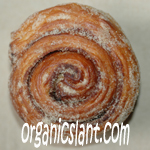 (Organic Slant) Many kinds of cinnamon, cinnamon-flavored foods, beverages and food supplements in the United States use a form of the spice that contains high levels of a natural substance that may cause liver damage in some sensitive people, scientists are reporting. Their study, published in ACS’ Journal of Agricultural and Food Chemistry, found similar results as those published in the European Union.
(Organic Slant) Many kinds of cinnamon, cinnamon-flavored foods, beverages and food supplements in the United States use a form of the spice that contains high levels of a natural substance that may cause liver damage in some sensitive people, scientists are reporting. Their study, published in ACS’ Journal of Agricultural and Food Chemistry, found similar results as those published in the European Union.
Ikhlas Khan and colleagues explain that cinnamon, which comes from the bark of certain trees, is one of the most important flavoring agents used in foods and beverages. “True,” or Ceylon, cinnamon is expensive, so most breads, sticky buns and other products in the United States use dried cassia bark, or cassia cinnamon.
Ceylon cinnamon contains very little coumarin, a naturally occurring substance that has been linked to liver damage in people sensitive to the substance. However, cassia cinnamon can contain larger amounts. Khan’s team decided to check on the coumarin content of a wide variety of food products.
Coumarin
Coumarin as an additive or as a constituent of tonka beans or tonka extracts is banned from food in the United States due to its potentially adverse side effects. However, coumarin in food from other natural ingredients is not regulated.
“True Cinnamon” refers to the dried inner bark of Cinnamomum verum. Other cinnamon species, C. cassia, C. loureiroi, and C. burmannii, commonly known as cassia, are also sold in the U.S. as cinnamon. In the present study, coumarin and other marker compounds were analyzed in authenticated cinnamon bark samples as well as locally bought cinnamon samples, cinnamon-flavored foods, and cinnamon-based food supplements using a validated UPLC-UV/MS method.
The experimental results indicated that C. verum bark contained only traces of coumarin, whereas barks from all three cassia species, especially C. loureiroi and C. burmannii, contained substantial amounts of coumarin.
These species could be potential sources of coumarin in cinnamon-flavored food in the U.S. Coumarin was detected in all locally bought cinnamon, cinnamon-flavored foods, and cinnamon food supplements. Their chemical profiles indicated that the cinnamon samples and the cinnamon in food supplements and flavored foods were probably Indonesian cassia,C. burmannii.
“As found in this study, coumarin was present, sometimes in substantial amounts, in cinnamon-based food supplements and cinnamon-flavored foods,” they say.
 Dark Honey Has More Illness-Fighting Agents Than Light Honey
Dark Honey Has More Illness-Fighting Agents Than Light Honey Study finds novel treatment targets for gout
Study finds novel treatment targets for gout FDA takes step to remove artificial trans fats in processed foods
FDA takes step to remove artificial trans fats in processed foods